I like the away one because it suits them. Come On Villa
Aston Villa Kit History
Here's your chance to take a look at the History of Aston Villa's Kits. Once you're done, tell us below what you think the Best and Worst Home/Away kits were.
Before we show you the kits you'll find a bit of interesting information about the AVFC historic kits.
Background of our Kits
The club was formed by members of the cricket team attached to the Aston Villa Wesleyan Methodist Chapel in Birmingham who wanted to establish a winter activity. After four of their number watched a game of rugby the members decided that the association rules were more to their taste.
Over time Villa developed strong ties with the large Scottish community who were drawn to the city’s burgeoning engineering industry. One Scot in particular, businessman, William McGregor, played an enormously influential role in the club and the professional game. McGregor was a teetotaler, a Methodist and an evangelist and he wanted to do something to help that part of the city. He had seen his first football match in Scotland at the age of eight and a couple of years after Aston Villa was formed he offered to help. A natural organiser and businessman, he was soon a vice-president of the club, and became Chairman at the time of Villa’s first organisationally traumatic period between 1885 and 1887, but which culminated in the club winning the FA Cup for the first time. It was at McGregor’s instigation that the Football League was formed in 1888 when the game threatened to fall into disrepute and collapse owing to fixtures not being kept to.
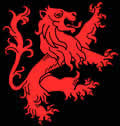
The team's first colours were described as "scarlet and royal blue stripes" (i.e. hoops - vertical stripes did not appear until the 1880s). The following season they wore black and white tops and in 1878 they purchased a set of black shirts emblazoned with the Scottish lion rampant. William McGregor actually went to Scotland to purchase the lion motifs and they were subsequently sewn on by the sister of the club secretary (ref: The Aston Villa Chronicles). The following season jerseys replaced the original shirts and it appears that the lion motif was removed after problems with the laundry. For their game against Heart of Midlothian on New Years' Day 1881, Villa wore navy and white hooped jerseys and there is evidence that these colours were worn at least until January 1884. A contemporary press cutting, however, indicates Villa wore black tops in an FA Cup tie with Notts County on 12 February 1881.
John Lerwill's research suggests that vertically striped in black and white were worn from at least May 1886 (and probably considerably earlier) while Bernard Gallagher has uncovered evidence that " piebald shirts" in white and red were perhaps worn before the striped tops appeared. Gauntlett has found a reference in the Birmingham Gazette dated 5 April 1884 that describes Villa playing against West Brom "in a brand new and pretty uniform." Alas the writer gives no further detail but it may be he was referring to the first use of the piebald tops. Given the scarcity of original references it is hard to be certain so the graphics presented above are to a degree, provisional.
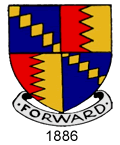
A contemporary press report submitted by Lee Gauntlett, states that Villa changed in November 1886 to blue and chocolate vertical stripes from the old piebald strip. These new shirts bore the Birmingham coat of arms of the time.
In 1887, the Villa adopted claret and blue for the first time, though the new colours were very similar to the chocolate and blue of 1886. In the early 1890s halved shirts were usually worn but from time to time they used plain claret tops with contrasting light blue sleeves. In 1894, Villa adopted the iconic woolen jersey with a distinctive contrasting neck band as their regular first choice, which John Lerwill has discovered, were designed by Ollie Whateley, who was Villa’s third England international and a graphic artist by trade. This style would be copied by many English clubs. Long after other professional clubs switched to wearing cotton shirts, Villa continued to wear these distinctive woolen jerseys, with subtle vertical ribbing.
By the end of the nineteenth century Aston Villa were established as aristocrats of the English game with five League Championships along with three FA Cup triumphs. In 1896/7 they also achieved the accolade of becoming the second side to do the League and Cup double.
There is a puzzling reference in the Birmingham Gazette of 30 September 1901 (researched by Lee Gauntlett) that states Villa were wearing red jerseys "to deflect the glare of the sun." The match was against Small Heath in the Birmingham Cup so it is unclear if this outfit ever appeared in the Football League.
During the Edwardian era they continued to be a major force, winning the championship once more in 1910 and taking the FA Cup in 1905, 1913 and 1920. In January 1924 a modified design was introduced with a high crew neck with two light blue bands, repeated at the cuffs. These jerseys were originally laced at the throat but the lacing was quickly discarded or lost in the laundry and the neckline became stretched, giving rise to a scruffy appearance, especially when the neckline flopped over on itself. The older, single hooped neckline re-emerged several times but the high, double banded neck did not disappear until the end of the 1955-56 season.
The 1930s were a period of relative decline and the club even suffered the humiliation of a brief stay in the Second Division (1936-1938).

With the introduction of the modern, "Continental" strip made from cotton in 1956, the club crest appeared on their shirts for the first time during their FA Cup, which ended with them winning the cup for the seventh time. It featured the traditional Scottish lion rampant that had first appeared in 1878. 
This FA Cup success proved a brief flash in the pan and by 1970 the club found themselves in the Third Division. Before he was sacked before the end of their relegation season, the charismatic Tommy Docherty introduced a radical new design of strip and a simplified crest. The innovative collars with v inset became de rigueur throughout the League. This unusual strip was dropped after Docherty's departure.
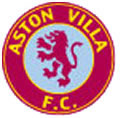
With Ron Saunders at the helm and yet another new crest (introduced in 1973), the late Seventies brought a return to Division One (1975) success in the League Cup twice (1975 and 1977) and in 1981, Villa won the League for the first time in 70 years. The following season, after a falling-out with the club's chairman, Saunders was replaced by his assistant, Tony Barton who led Villa to victory in the European Cup Final followed by the European Super Cup (contested between the European Champions and European Cup Winners' Cup) the following season.
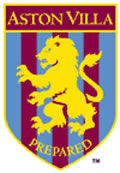
These achievements marked the high point in Villa's career and in 1987, they were relegated to the Second Division. Under Graham Taylor, they bounced straight back and finished as runners-up in 1990. Two years later they became founder members of the Premier League, wearing a striking strip inspired by the iconic hoop-neck jerseys first seen in 1890 and bearing a rather more traditional crest.
In the Nineties, Aston Villa were inconsistent in the league but did win two League Cups, regularly qualified for Europe and were beaten FA Cup finalists in 2000.
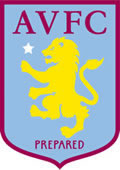
In 2006, following the acrimonious departure of manager, David O'Leary, Villa's chairman, Doug Ellis decided to retire on health grounds and sold his 38% stake in the club to Randy Lerner, owner of NFL franchise team, Cleveland Browns. Martin O'Neill was appointed as manager and sweeping changes made behind the scenes, which included yet another redesigned crest, which appeared in 2007. A small white star represented Villa's European Cup win.
In 2008 Villa broke new ground when they wore the logo of Acorns Children's Hospice on their shirts in place of the usual commercial sponsorship.
I think that the Best and Worst Home/Away kits were worn during the year/s.....
Date: 28/07/2012
Subject: BEST AND WORST
I THINK THE BEST HOME AND AWAY ARE 1982/83 & 1957 FA CUP FINAL.
THE WORST ARE 1884/86 & THE ONE VERSUS ROTHERHAM IN 1953, JUST REMINDS ME OF BLUES!11
Date: 28/07/2012
Subject: kit
best kits are the ones we have now, the worst ones are ones without the villa badge on it
Date: 28/07/2012
Subject: kits
best.
home 1985-86. away 2012-13
worst
home 1886-87. away 1993-95
Date: 28/07/2012
Subject: favourite n worst
My favourite's are - Home 1965/66(cus i was born in 65 lol). Away has gotto be 1997/98, lovely shirt.
The worst ones are - Home 1884/86. Away 1983/84
New comment
Home Kits.
*Please note, During some seasons Aston Villa wore more than one Home Shirt

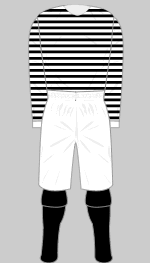

1874-77 1877-78 1878-79



1879-81 1881-84 Feb 1884



Mar 1884 Apr 1884-86 May 1886


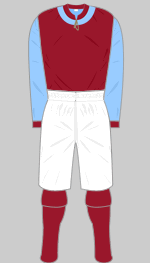
Nov 1886-87 1887-90 1890-91
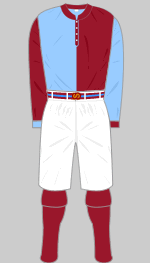
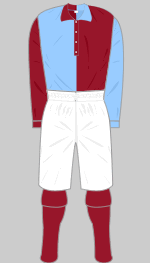

1890-92 1892-94 1893-94


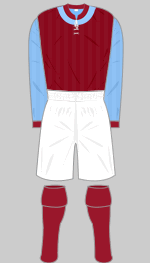
1894-1900 1901-05 1905-07
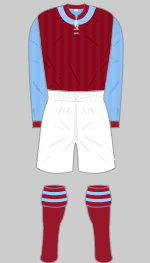

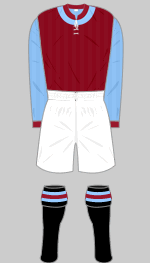
1907 - Dec 23 Jan 1924 - 35 1935-36



1936-44 1946-55 1955-56



1956- Jan 57 Jan - May 1957 1957-58



1958-59 1959-61 1961-63



1963-65 1965-66 1966-68



Sep 1968 - Jan 69 Feb - May 1969 Aug 1969-70

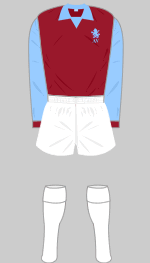

Jan - May 1970 1970-71 1971-73

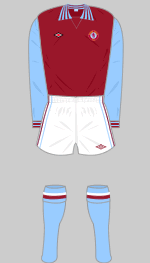
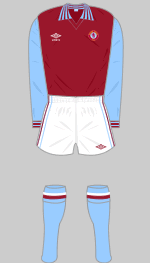
1973-75 1975-76 1976-81
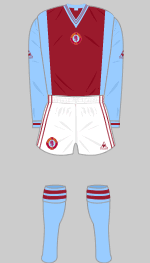

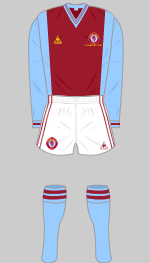
1981-82 1982-83 1982-83 Euro
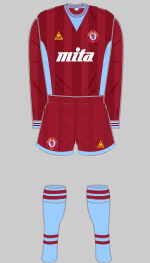
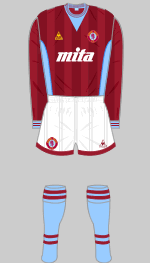

1983-84 1984-85 1985-86



1986-87 1985-87 1987-88
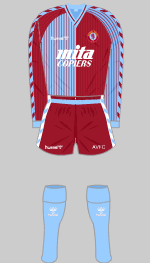

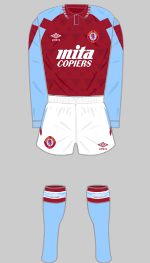
1988-89 1989-90 1990-92
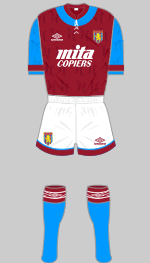
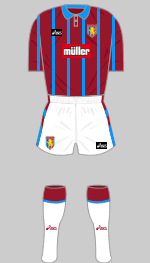
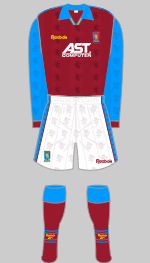
1992-93 1993-95 1995-97
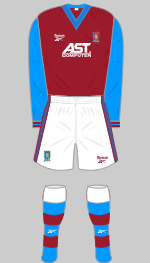


1997-98 1998-99 1999-2000

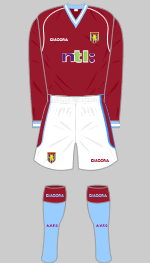

2000-01 2001-02 2002-03
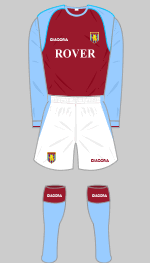
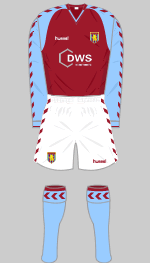
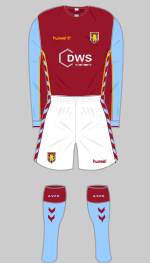
2003-04 2004-05 2005-06

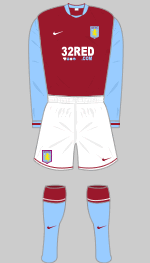
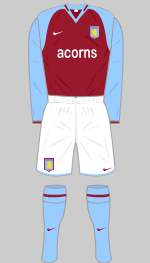
2006-07 2007-08 2008-09
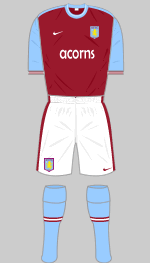
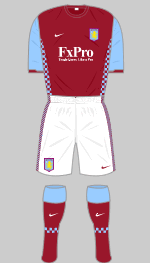
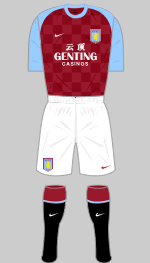
2009-10 2010-11 2011-12
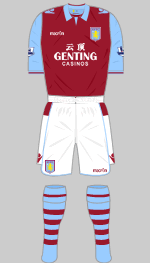
2012-13
Away kits & 3rd Kits
*Please note, Aston Villa never had an Away Kit in some seasons.
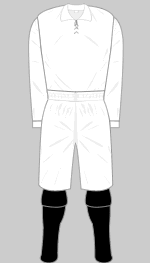

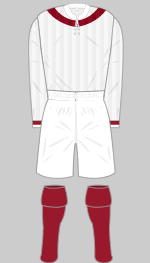
1888-92 1905-06 1906-07
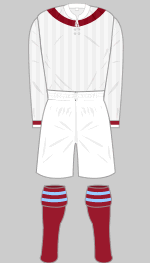
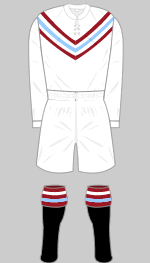
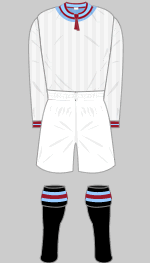
1920-21 1922-23 1923-29
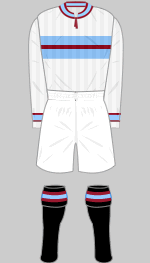
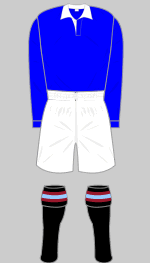

1930-31 V Arsenal (fac) 3/3/34 1933-34


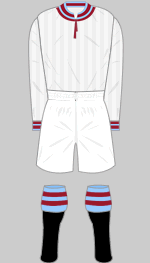
1934-35 1935-36 1937-38


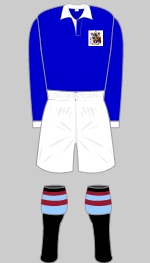
1945-46 1947-55 V Rotherham, Feb 1953
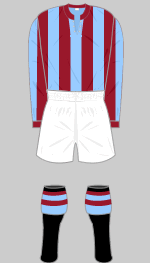
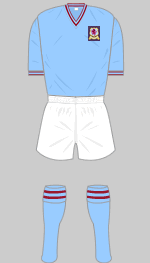
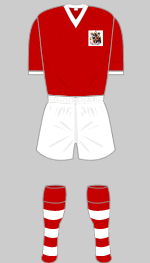
1955-56 Dec 1956-62 V Burnley, Mar 1957
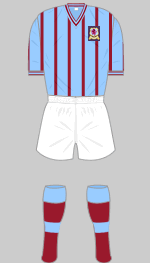
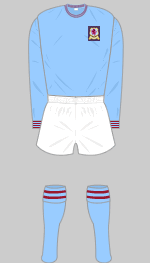
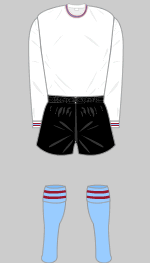
1957 FA Cup Final 1962-63 1963-64
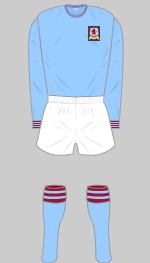
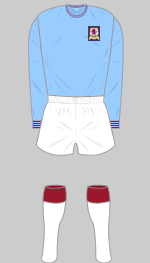
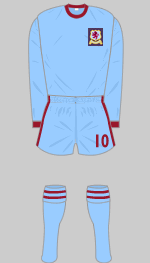
1964-65 1965-66 1966-67
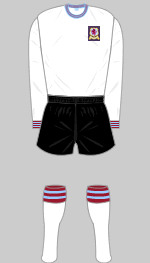
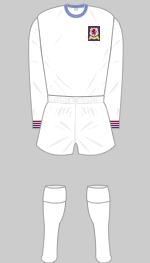
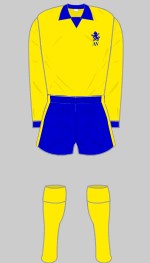
1967-68 1968-69 1969-73
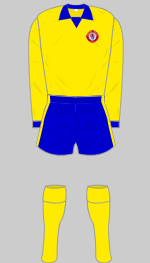
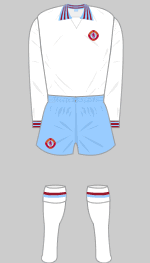
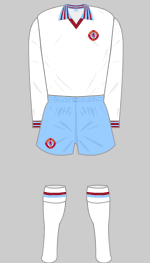
1973-74 1974-75 1975-76
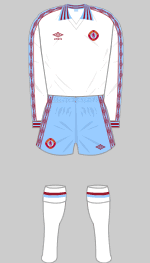
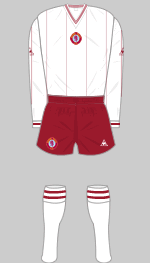
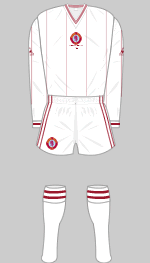
1976-81 1981-82 1982 Euro. Cup Final
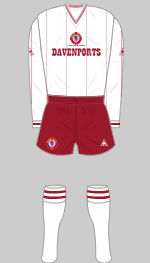
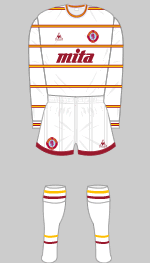
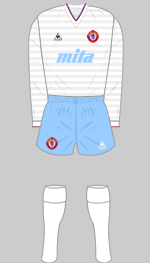
1982-83 1983-84 1984-85
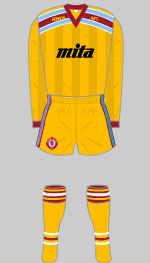
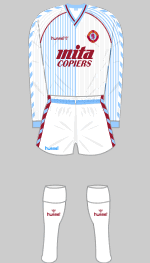
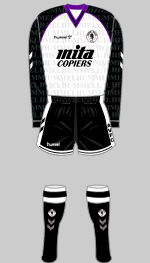
1985-87 1987-89 1989-90
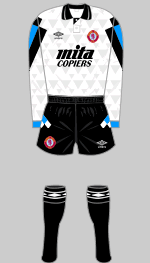
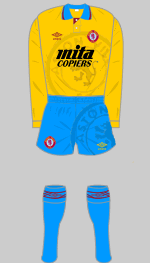
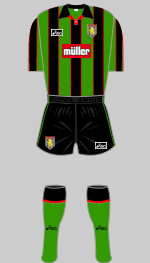
1990-93 3rd kit, 1991-93 1993-95
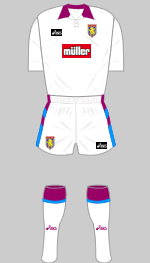
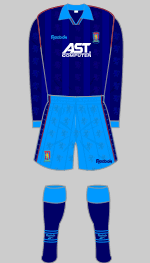
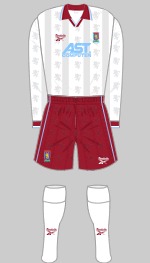
V Trabzonspor, 94/95 1995-96 (3rd kit 96/97) 1996-97 (3rd kit 97/98)
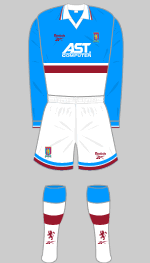
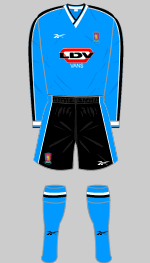
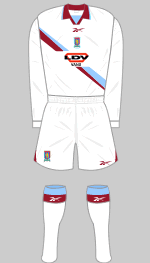
1997/98 1998-99 (3rd kit 99-00) 1999-2000

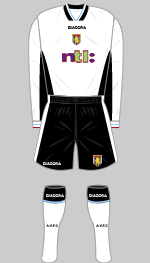
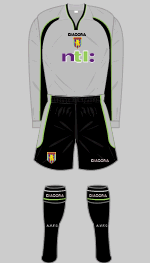
2000-2001 3rd kit 2000-01 2001-02
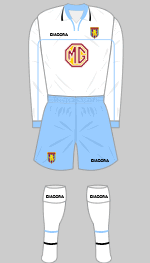
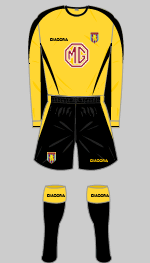
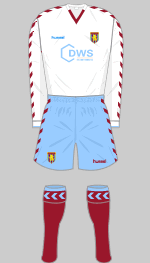
2002-03 2003-04 2004-05
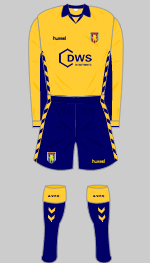
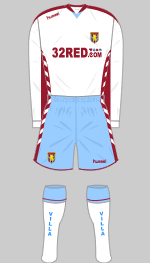
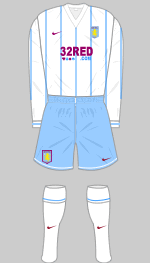
2005-06 2006-07 2007-08
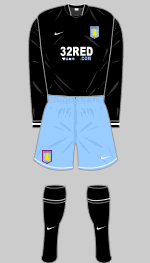
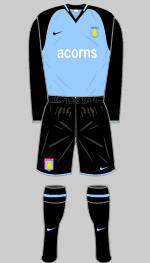
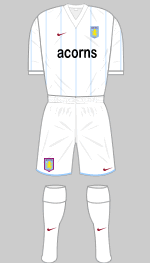
3rd kit 2007-08 2008-09 V CSKA Moscow, 02-09
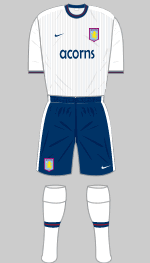
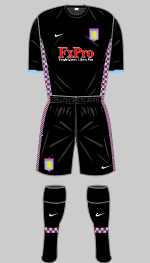
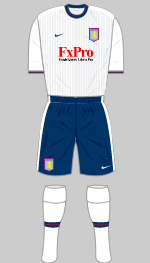
2009-10 2010-11 3rd kit 2010-11

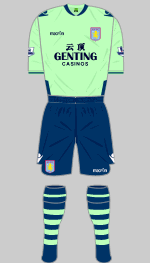
2011-12 2012-13

